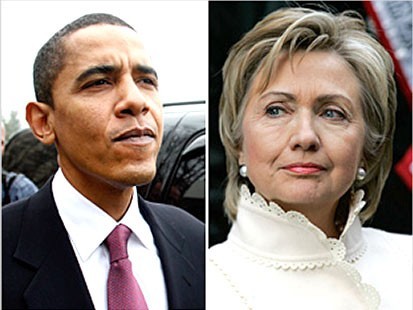Hillary Clinton's last stand? Barack Obama hopes for Pennsylvania surprise
Washington -  It has been a long, tiring and bitter six weeks of campaigning. But Pennsylvania's time has finally arrived.
It has been a long, tiring and bitter six weeks of campaigning. But Pennsylvania's time has finally arrived.
The eastern US state's diverse mix of voters, who have received unprecedented attention due to the protracted nomination battle between Democratic presidential hopefuls Barack Obama and Hillary Clinton, will have their say on Tuesday.
For Clinton, Pennsylvania is the largest state left in a string of must-win contests, if she is to have any chance of receiving the Democratic Party's nod to run in the November general election.
For Obama, who maintains a small but solid lead in the all-important delegate count with only eight state primaries to go, a win in Pennsylvania would almost certainly provide the knock-out blow he has long sought.
That is unlikely. Opinion polls have consistently given Clinton the edge ever since campaigning in the state got underway, after the last primary elections on March 4 in Texas and Ohio.
But Clinton's lead has narrowed - from as much as 20 points last month to an average of 6 percentage points in the final week, according to an average of statewide polls compiled by realclearpolitics. com.
But while victories for Clinton in Ohio and Texas breathed new life into her sagging campaign, pundits say she will need a decisive win in Pennsylvania to keep that momentum going.
The reason lies in the ever-fewer remaining delegates up for grabs to the party's nominating convention in August. A total of
2,024 are needed to win, and only about 850 are left unpledged.
Obama holds a lead over Clinton of 164 from delegates awarded in the more than 40 state contests already held since early January. He leads by 140 when including super-delegates - party activists, politicians and statesmen that can endorse whichever candidate they choose.
In Pennsylvania, 188 of those delegates are at stake. But because the delegates are awarded proportionally, even a
20-percentage-point victory by Clinton would close the gap with Obama by less than 40.
Obama, Clinton and their surrogates have crisscrossed the state in the last six weeks in an increasingly bitter contest that has left some Democratic leaders worried of a split within the party which may be difficult to close.
The word "bitter" took on a new relevance last week on the campaign trail. Obama used it to characterize small-town Americans who he claimed had resorted to religion and guns out of disenchantment with politics and despair over their economic situation.
Clinton and presumptive Republican nominee John McCain seized on the comments as "elitist" and "out of touch," and Obama has since apologized if the remarks caused offence.
For Obama, Pennsylvania is also the first electoral test since a controversy erupted over the racially incendiary remarks of his former pastor and spiritual advisor, Reverend Jeremiah Wright Jr, who among other things in church sermons suggested the US had brought on itself the terrorist attacks of September 11, 2001.
Obama, who is vying to become the first African American president, has called Wright's comments "extremely offensive" and sought to allay the concerns in a broad speech on the state of race relations last month in Philadelphia.
Pennsylvania, with 14.2 million people, is the sixth largest US state and closely divided between Democrats and Republicans.
With primary victories for Clinton so far in California, Texas, Ohio, Massachusetts and New York, the former first lady hopes a win in Pennsylvania will fuel her argument that she has the big-state support needed in the November general election.
Clinton will be relying on the votes of blue-collar workers that helped her win neighbouring Ohio and are concentrated in the state's central and western regions around the city of Pittsburgh.
Much of Obama's vote will likely come from the east in and around the state's largest city of Philadelphia - a large community of African Americans and urban professionals.
Meanwhile McCain, who wrapped up the Republican nomination in early March, has spent the last six weeks raising money for his general election campaign, travelling to the Middle East and Europe and laying out the broad strokes of his foreign and economic policy.
With McCain waiting in the wings, Democratic National Committee Chairman Howard Dean has said his party must have a nominee by the end of June at the latest.
Barring a knock-out blow in Pennsylvania, the Obama-Clinton battle will continue to North Carolina and Indiana on May 6. (dpa)